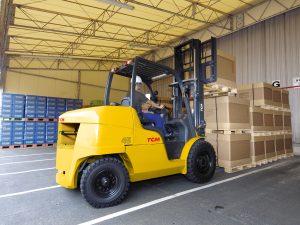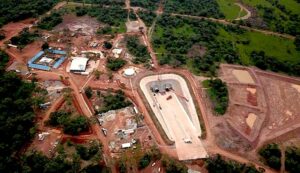Element Africa: Ghanaian communities challenge mining regulation and Shell spills more oil in the Niger Delta
- Anger rises as Shell pipeline contaminates river and farms in southeastern Nigeria.
- Activists call for new mining legislation to be scrapped as Ghana’s government grants license to mine gold in a forest reserve.
- Also in Ghana, residents march in protest against a community mining scheme.
- Element Africa is Mongabay’s bi-weekly bulletin of brief stories from the extractives industry in Africa.
Anger over latest oil spill as Shell pipeline contaminates river and farms in Nigeria
Nigeria’s National Oil Spill Detection and Response Agency (NOSDRA) says an oil spill from Shell’s Trans Niger Pipeline, which passes through numerous communities in southeastern Rivers state, has extensively contaminated a river and stretches of farmland. The pipeline transports as much as 180,000 barrels of crude oil across Ogoniland, one of the country’s most polluted regions.
NOSDRA said crude oil spilled into the Okulu River on June 11. Shell said it was working with a joint investigative team of regulators, residents and civil society to identify the cause and impact of the spill.

Investigators have not yet given an estimate of the volume of the spill, but a local activist said it was the worst in the area in more than a decade.
“It lasted for over a week, bursts into Okulu River — which adjoins other rivers and ultimately empties into the Atlantic Ocean — and affects several communities and displaces more than 300 fishers,” Fyneface Dumnamene, head of the nonprofit Youths and Environment Advocacy Center, which monitors spills in the region, told the Associated Press.
Dumnamene told Mongabay a second spill occurred on June 18, this time from a facility belonging to the state-owned Nigerian National Petroleum Corporation.
Oil spills are a frequent occurrence across the Niger Delta. A report published in May said Shell and other oil and gas companies have spilled 110,000 barrels of oil in neighboring Bayelsa state over the past 50 years. Decades of oil production have badly affected fishing and farming communities and compromised the delta’s rich biodiversity, which includes threatened species like manatees (Trichechus senegalensis), chimpanzees (Pan troglodytes ellioti) and the Niger Delta red colobus (Piliocolobus epieni).
NOSDRA director general Idris Musa said the agency’s response to the Shell spill was delayed by protests by the residents.
Dumnamene said locals were angry and want the company to pay for the damage caused. “I think they need to engage with the community. It [the protest] is a normal thing that happens when there’s oil spill; people are angry.”
Getting oil firms to clean up or pay for environmental damage can be difficult and lawsuits can run for years.

Activists call for new mining legislation to be scrapped in Ghana
Forest defenders want new legislation regulating mining in forest reserves scrapped, pointing to the granting of a license in an intact forest in February. The country’s Environmental Protection Agency said new legislation passed in November was intended to fill gaps in existing laws. Activists say it has actually granted the presidency new powers to approve mining, even in Globally Significant Biodiversity Areas.
“If the EPA is telling us there is a gap, then they should tell us what that gap is,” Daryl Bosu told Mongabay. Bosu is the deputy director of A Rocha Ghana, one of five NGOs that published a petition against the new legislation earlier this month.
“The new L.I. [legal instrument] has taken a posture that if the necessary documentation is secured and — in respect of protected areas — if the government gives the go-ahead, all forest reserves are liable for mining contrary to the previous existing guideline, which completely excluded protected forest reserves from all mining activities,” he said.
He told Mongabay the new law’s provisions were kept hidden from civil society until the EPA shared details at a workshop in Accra in March, but there is already evidence of the danger the new legislation poses.
Boin Tano, a 129-square-kilometer (50-square-mile) forest reserve in Ghana’s Western Region, is a relatively intact forest that is home to yellow-billed turacos (Tauraco macrorhynchus), pied hornbills (Tockus fasciatus) and the vulnerable white-breasted guinea fowl (Agelastes meleagrides), as well as the white-thighed colobus (Colobus vellerosus) and western chimpanzees (P. t. verus). These last two species are critically endangered, but a mining lease for Boin Tano was granted in February. Bosu said this would not have been possible under the previous law.
“Any serious government who is really committed to forest conservation and climate action will not make such a retrogressive law,” he told Mongabay. He said the government should immediately scrap the new law and consult with interested parties to draw up a better one.

Community marches in protest of special mining licenses
AKOON and BOGOSO, Ghana — Residents of two towns in Ghana’s Western Region recently marched in protest against “community mining schemes” in their area.
In 2021, the government of Ghana introduced the schemes at six locations around the country, with the aim of reducing illegal mining, commonly known as “galamsey.” The community mining scheme created a special license available only to Ghanaian nationals practicing small-scale mining, with the intent of improving regulation of galamsey operations.
But residents in the communities of Akoon and Bogoso say that rather than encouraging sustainable and responsible mining, the scheme has become a death trap for local people. They say harmful impacts of mining have increased under the new regulation, with blasting of rocks causing huge cracks in homes and other buildings, threatening them with collapse.
They also say that Chinese nationals are involved in the community mining scheme, blaming them for introducing the use of explosives, which local miners had not previously relied on.
“The community mining is no more helping us. The Chinese have taken over the community mining and they are blasting, which is making our houses weak after developing cracks. We want the Chinese to stop the mining,” said Kofi Apinko, a resident and small-scale miner.
Another resident, Joshua Nsaidoo, said mining operations threatened to cut the towns off from the rest of the region. “The Chinese have extended the mining to the side of the road, making it difficult for us to use the road, especially during this rainy season. We had to make a detour in order to get to town.”
Awudu Salami, Ini Ekott, and Mabel Annang Adorkor contributed to this bulletin.
Share this content:














